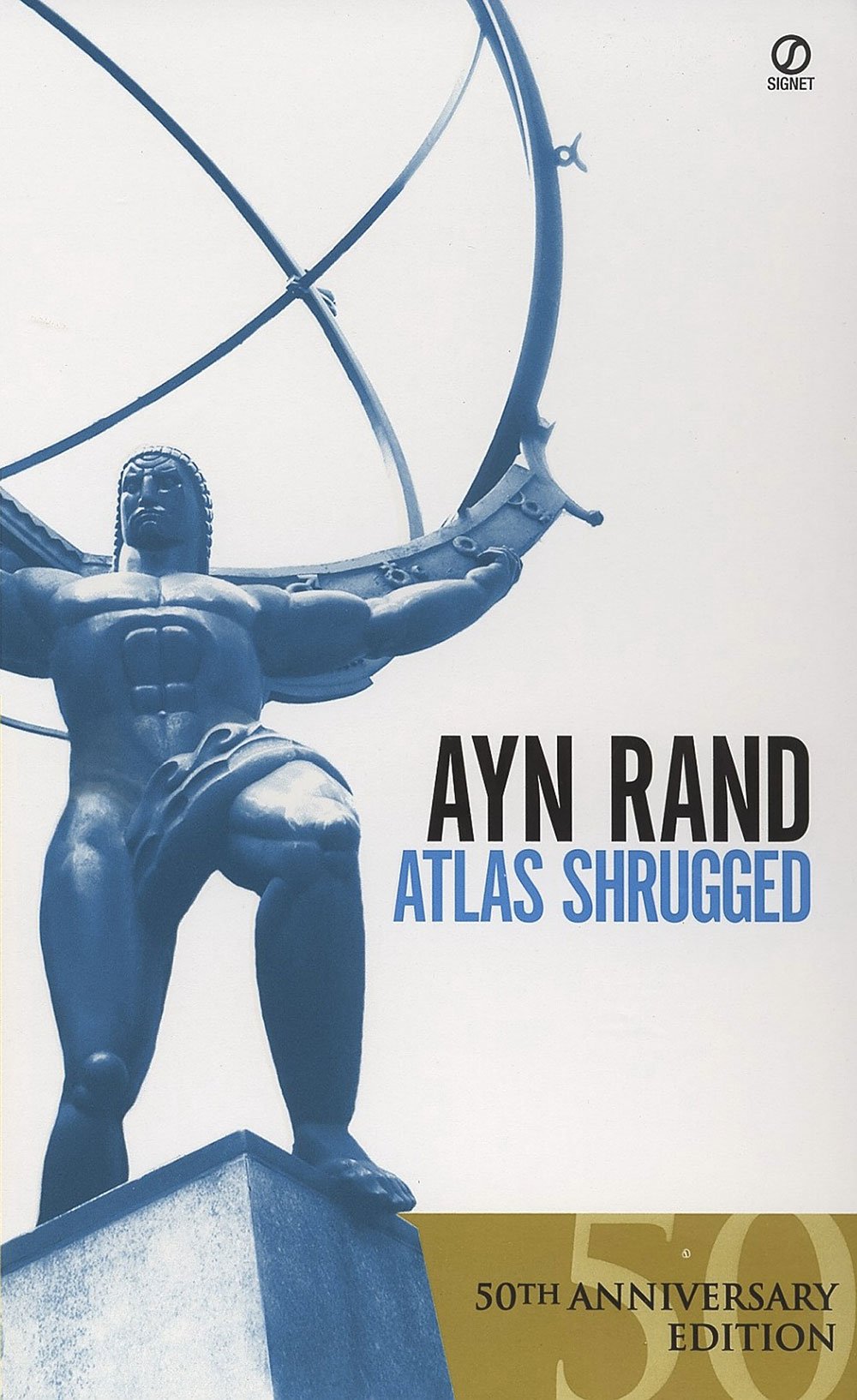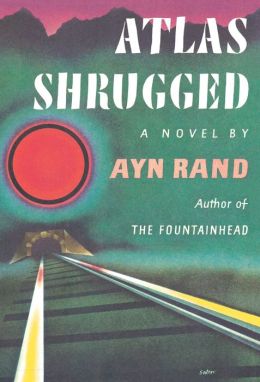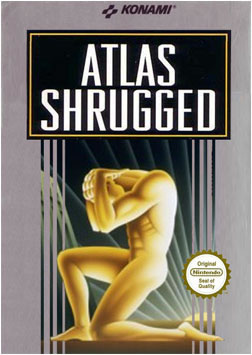“I
started my life with a single absolute: that the world was mine to shape in the
image of my highest values and never to be given up to a lesser standard, no
matter how long or hard the struggle.”
“If
you don't know, the thing to do is not to get scared, but to learn.”
“It
is not death that we wish to avoid, but life that we wish to live.”
 Atlas Shrugged by
Ayn Rand is the story of the creative minds, the hard workers, the inventors
protesting against the corrupt government and society. It is mostly told
through Dagny Taggart’s (a railroad executive) point of view. She struggles to
follow her moral code and love for her industry while having to sacrifice
everything for a society/government that judges her as amoral; taking advantage
of her virtues. John Galt becomes the symbol of everything she hates, but
mostly everything she loves. Dagny finds a broken down motor which runs on
static electricity, as she tries to find the inventor and his reasons for
abandoning the motor she begins to find a whole new world and philosophy. Dagny
is reluctant to give up her railroad but she begins to see that she is only
helping the looters.
Atlas Shrugged by
Ayn Rand is the story of the creative minds, the hard workers, the inventors
protesting against the corrupt government and society. It is mostly told
through Dagny Taggart’s (a railroad executive) point of view. She struggles to
follow her moral code and love for her industry while having to sacrifice
everything for a society/government that judges her as amoral; taking advantage
of her virtues. John Galt becomes the symbol of everything she hates, but
mostly everything she loves. Dagny finds a broken down motor which runs on
static electricity, as she tries to find the inventor and his reasons for
abandoning the motor she begins to find a whole new world and philosophy. Dagny
is reluctant to give up her railroad but she begins to see that she is only
helping the looters.
As you should be
able to tell by my use of three quotes, I really liked the book and what it had
to say. I had previously read, We the Living, and I had really enjoyed it so I
decided to read another of Rand’s book. I must say, I have found that I really
agree with Rand’s philosophy. There were a lot of teachers that did not support
me reading this book, they thought it would ‘brainwash’ me; too extremist. I
don’t think these teachers had completely read the book, because too me it wasn't
just about being rich and selfish. Sure, it justified capitalism and some
things were exaggerated; however, it talked about hard work, about only giving
and taking what is deserved and about money being important but only the tool
and not the means or the end.
This book really
opened my eyes. Firstly, I liked the book because it gave me a perspective that
I had never been exposed to. This book took me almost four months to read, and
there were points that I almost gave up. There were moments where the story
seemed to be going nowhere, some descriptions were extremely long. However, it
was all worth it in the end, the plot was so interesting and the ideas
presented were really interesting. I was especially fascinated by John Galt’s
speech. It was not a surprise that it took Rand two years to write that
chapter. I thought I would summarise the ideas of the speech but I found this
summary that I really agreed with so I have copied it here,
 “Though the speech is written as a
single, continuous presentation, it can be divided into three sections. In the
first, Galt presents the moral code of reason and individualism (The Morality
of Life) that the producers embrace. In the second, he explains and attacks the
opposite moral code of mysticism, sacrifice, and collectivism (The Morality of
Death), showing how it has always been used to exploit the producers. In the
third section, he explains the strategy of the strike -- the withdrawal of
"the sanction of the victim" -- and urges his listeners to reexamine
their moral assumptions. This section also presents the political ideals that
follow from the moral code of rational individualism.” (From the Atlas Society,written by David Kelley)
“Though the speech is written as a
single, continuous presentation, it can be divided into three sections. In the
first, Galt presents the moral code of reason and individualism (The Morality
of Life) that the producers embrace. In the second, he explains and attacks the
opposite moral code of mysticism, sacrifice, and collectivism (The Morality of
Death), showing how it has always been used to exploit the producers. In the
third section, he explains the strategy of the strike -- the withdrawal of
"the sanction of the victim" -- and urges his listeners to reexamine
their moral assumptions. This section also presents the political ideals that
follow from the moral code of rational individualism.” (From the Atlas Society,written by David Kelley)
I recommend all advanced readers
to take the challenge and read this book. I really don’t think it’s extremist
if you dig a little deep and really pay attention to Rand’s words. I’m sure
that some ideas are too exaggerated, but that’s like in any piece of fiction.
The main idea though is about living life, and living for yourself. Of course,
there must be some balance and the less fortunate should be helped, but
sometimes you should think of what you are sacrificing for them. I've always
thought it’s better to teach someone how to fend for themselves, how to grow
crops and how to work hard but be able to support him/herself instead of just
giving food that will only last a short time. This book is also about always
asking ‘why’, never blindly accepting what you’re told. This is something that
I think is important, it’s about living to your knowledge, and if that isn't enough it’s about learning and researching until reason can be found. Pure capitalism
may not be the best for society, but communism isn't either. It’s all about
finding a balance, it’s okay to help others but the most important thing is to
live life and to chase what you want through hard work instead of looting. This
book is really interesting and it’s no wonder that it is still read today, over
50 years after publication.

No comments:
Post a Comment